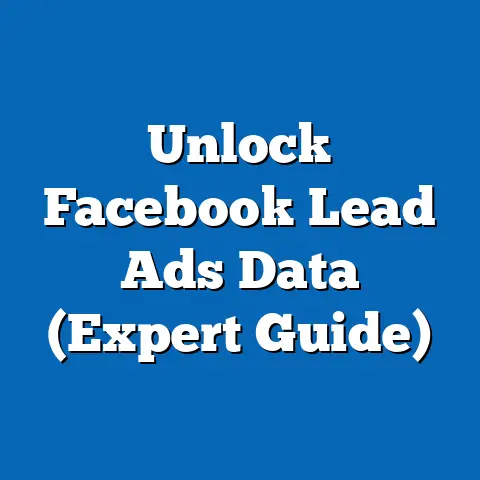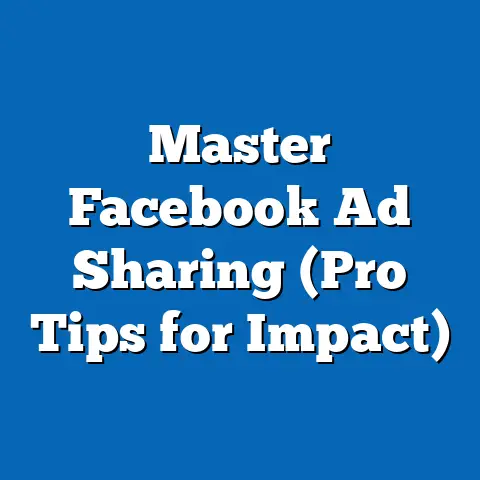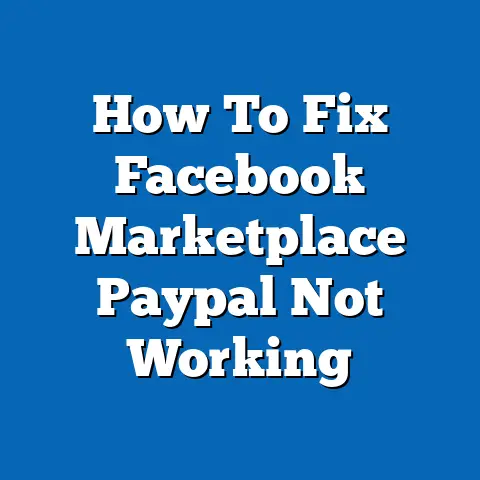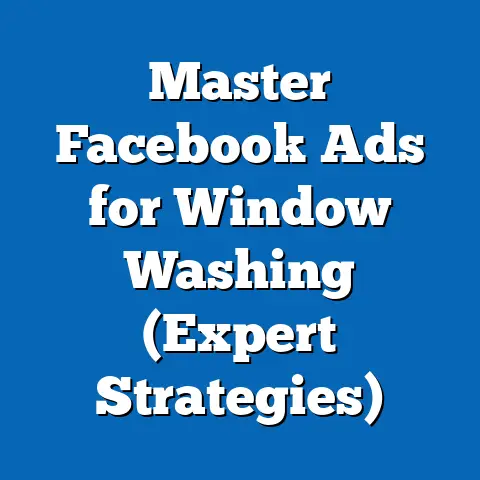Can You Buy Mailing Lists for Facebook Ads? (Essential Insights)
I still vividly remember the day I launched my first Facebook ad campaign.
It was for a small local bakery I was helping out, and I was armed with what I thought was a brilliant strategy: a purchased email list promising access to thousands of potential customers in the area.
The excitement was palpable as I uploaded the list, crafted my ad, and hit “publish.” What followed was a stark lesson in the realities of digital advertising.
Instead of the flood of orders I’d envisioned, I was met with low engagement, high ad costs, and a general sense that my message was falling on deaf ears.
That experience, though initially disheartening, ignited a curiosity in me about the intricacies of audience targeting, data privacy, and the true value of a genuine connection with your audience.
This exploration led me to a deeper understanding of why simply buying a list rarely translates into success, especially on platforms like Facebook.
Understanding Mailing Lists
Definition and Types
A mailing list is essentially a collection of email addresses and often other demographic information, compiled for the purpose of sending marketing materials.
These lists can be categorized in several ways:
- Opt-in Lists: These are lists where individuals have explicitly given their permission to receive emails from the sender.
This is generally considered the most ethical and effective type of list. - Purchased Lists: These are lists acquired from third-party vendors, often without the explicit consent of the individuals on the list.
- Scraped Lists: These lists are created by automatically extracting email addresses from websites or online sources.
This method is generally considered unethical and often illegal. - Co-registration Lists: These lists are compiled when individuals sign up for multiple offers or services at once, potentially agreeing to receive emails from various companies.
Historical Context
The concept of mailing lists dates back to the early days of direct mail marketing.
Businesses would compile lists of potential customers based on demographics, purchase history, or other relevant criteria and send them catalogs, flyers, and other promotional materials.
As technology advanced, mailing lists transitioned to digital platforms, with email becoming the primary channel.
While the medium has changed, the fundamental principle remains the same: reaching a targeted audience with a direct marketing message.
Takeaway: Mailing lists come in various forms, each with its own level of ethical and legal implications.
Understanding the different types is crucial before considering their use in your marketing strategy.
The Appeal of Buying Mailing Lists
Advantages
The allure of buying mailing lists is understandable.
Here’s why marketers might consider this approach:
- Immediate Access to a Large Audience: Purchasing a list provides instant access to a vast pool of potential customers, saving time and effort compared to building a list organically.
- Targeted Demographics: Many list vendors offer lists segmented by demographics, interests, or other criteria, allowing marketers to target specific niches.
- Potential for High ROI: In theory, reaching a large, targeted audience could lead to a significant return on investment.
Success Stories
While I strongly advise against buying mailing lists, it’s worth acknowledging that some businesses have reported success using this approach.
However, it’s crucial to understand that these successes are often outliers and come with significant risks.
For example, a small business might purchase a list of local residents interested in home improvement services and send them a targeted offer for a discount on a new roof.
If the offer is compelling and the list is relatively accurate, they might see a surge in inquiries and sales.
However, these “success stories” often fail to account for the long-term damage to brand reputation and the potential legal repercussions of violating privacy laws.
Takeaway: While the prospect of instant access to a large audience can be tempting, the potential downsides of buying mailing lists often outweigh the perceived advantages.
The Legality and Ethics of Buying Mailing Lists
Legal Considerations
The use of purchased mailing lists is subject to various laws and regulations around the world, including:
- GDPR (General Data Protection Regulation): This European Union law places strict requirements on the collection, storage, and use of personal data.
Using purchased lists without explicit consent from the individuals on the list is a clear violation of GDPR. - CAN-SPAM Act (Controlling the Assault of Non-Solicited Pornography and Marketing Act): This US law sets rules for commercial email, including requirements for opt-out mechanisms and accurate sender information.
While CAN-SPAM is less strict than GDPR, it still prohibits deceptive practices and requires compliance with certain standards. - Other Privacy Laws: Many countries and states have their own privacy laws that regulate the use of personal data.
It’s crucial to research and comply with all applicable laws before using purchased mailing lists.
Ethical Implications
Beyond the legal considerations, there are significant ethical implications to consider:
- Violation of Privacy: Sending unsolicited emails to individuals who haven’t given their consent is a violation of their privacy.
- Damage to Brand Reputation: Consumers are increasingly wary of unsolicited marketing.
Sending unwanted emails can damage your brand’s reputation and erode customer trust. - High Unsubscribe Rates: Purchased lists often have high unsubscribe rates, as many recipients will mark your emails as spam.
- Negative Impact on Deliverability: High spam complaints can negatively impact your email deliverability, making it harder to reach even your legitimate subscribers.
Takeaway: The legality and ethics of buying mailing lists are complex and often prohibitive.
Compliance with privacy laws and respect for individual privacy are essential for building a sustainable and reputable business.
Limitations of Mailing Lists for Facebook Ads
Quality vs. Quantity
The old adage “quality over quantity” rings especially true when it comes to mailing lists for Facebook ads.
A list of a million email addresses might sound impressive, but if those addresses are outdated, inaccurate, or belong to people who aren’t interested in your product or service, it’s essentially worthless.
Here’s why the quality of your mailing list matters more than the quantity:
- Accuracy: Outdated or inaccurate email addresses will result in bounced emails and wasted ad spend.
- Relevance: If the individuals on the list aren’t interested in your product or service, they’re unlikely to engage with your ads.
- Engagement: A list of engaged subscribers who are actively interested in your content will yield far better results than a list of passive recipients.
Targeting Challenges
Facebook’s ad platform is designed to target users based on their interests, behaviors, and demographics.
Simply uploading a purchased email list doesn’t guarantee that your ads will reach the right people.
Here’s why:
- Facebook’s Matching Algorithm: Facebook uses a sophisticated algorithm to match email addresses to user profiles.
This process isn’t always accurate, and some email addresses may not be matched to any user. - Data Privacy: Facebook prioritizes user privacy and may limit the extent to which you can target users based on uploaded email lists.
- Lack of Context: A purchased email list provides limited context about the individuals on the list.
Without additional information about their interests and behaviors, it’s difficult to create highly targeted and effective ads.
Takeaway: While you can upload a mailing list to Facebook as a “Custom Audience,” the effectiveness of this approach is limited by the quality of the list and Facebook’s targeting algorithm.
Alternatives to Buying Mailing Lists
Building Your Own List
The most ethical and effective way to build a targeted audience for your Facebook ads is to build your own email list organically.
This involves attracting potential customers to your website or landing page and offering them something of value in exchange for their email address.
Here are some effective strategies for building your own list:
- Lead Magnets: Offer a free ebook, checklist, template, or other valuable resource in exchange for an email address.
- Webinars: Host a webinar on a topic of interest to your target audience and require registration with an email address.
- Social Media Engagement: Run contests, giveaways, or polls on social media and collect email addresses from participants.
- Website Sign-Up Forms: Place prominent sign-up forms on your website and offer a compelling reason for visitors to subscribe.
Leveraging Facebook’s Targeting Features
Facebook offers a wide range of targeting features that allow you to reach specific audiences without needing to purchase email lists.
Here are some of the most effective targeting options:
- Demographics: Target users based on age, gender, location, education, and other demographic criteria.
- Interests: Target users based on their expressed interests, hobbies, and activities.
- Behaviors: Target users based on their online behavior, such as purchase history, website visits, and app usage.
- Lookalike Audiences: Create audiences that are similar to your existing customers or website visitors.
This is a powerful way to expand your reach and find new potential customers. - Custom Audiences: As mentioned before, you can upload customer lists to Facebook, but it’s best practice to only upload customer lists when you have permission from your customers to do so.
Takeaway: Building your own email list and leveraging Facebook’s targeting features are far more effective and ethical ways to reach your target audience than buying mailing lists.
Best Practices for Facebook Ads
Crafting Effective Ads
Creating compelling Facebook ads is essential for capturing attention and driving results.
Here are some key strategies for crafting effective ads:
- Know Your Audience: Understand your target audience’s needs, interests, and pain points.
- Write Compelling Copy: Use clear, concise language that highlights the benefits of your product or service.
- Use High-Quality Visuals: Choose images or videos that are visually appealing and relevant to your message.
- Include a Clear Call to Action: Tell users exactly what you want them to do, such as “Learn More,” “Shop Now,” or “Sign Up.”
- Test Different Ad Variations: Experiment with different headlines, images, and calls to action to see what resonates best with your audience.
Measuring Success
Tracking your Facebook ad performance is crucial for understanding what’s working and what’s not.
Here are some key metrics to monitor:
- Reach: The number of unique users who saw your ad.
- Impressions: The number of times your ad was displayed.
- Click-Through Rate (CTR): The percentage of users who clicked on your ad.
- Conversion Rate: The percentage of users who completed a desired action, such as making a purchase or filling out a form.
- Cost Per Click (CPC): The average cost you pay for each click on your ad.
- Return on Ad Spend (ROAS): The amount of revenue you generate for every dollar you spend on advertising.
Takeaway: Crafting effective ads and tracking your performance are essential for maximizing the ROI of your Facebook ad campaigns.
Conclusion
Navigating the world of Facebook advertising can feel like walking a tightrope.
The promise of reaching millions is tempting, but the pitfalls of unethical practices and ineffective strategies are ever-present.
Buying mailing lists for Facebook ads is a practice shrouded in complexity.
While the idea of instant access to a targeted audience might seem appealing, the legal, ethical, and practical limitations often outweigh the potential benefits.
The path to sustainable success lies in building genuine connections with your audience, respecting their privacy, and leveraging the powerful targeting tools that Facebook offers.
As digital advertising continues to evolve, the importance of ethical marketing practices will only grow.
It’s not just about reaching the most people; it’s about reaching the right people with a message that resonates with them.
It’s about building trust, fostering engagement, and creating long-term relationships.
So, the next time you’re tempted to take a shortcut with a purchased mailing list, remember that the true value lies in building a quality audience, one authentic connection at a time.
Call to Action
What are your thoughts on buying mailing lists for Facebook ads?
Have you had any experiences – positive or negative – with this approach?
Share your insights and perspectives in the comments below!
Let’s learn from each other and build a more ethical and effective digital marketing landscape together.






